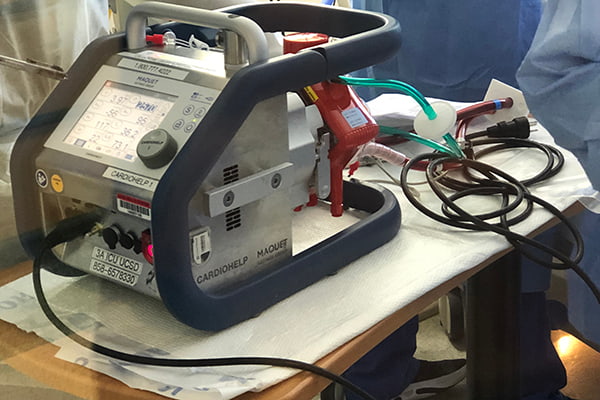Daily Business Report-Dec. 21, 2020
Illustration by Anne Wernikoff for CalMatters, iStock
Can California protect COVID-19 vaccine
from cheaters and fraudsters?
State leaders believe the rich and influential will have a hard time
cutting into line to get the first precious doses of the vaccine
ByAna B. Ibarra | CalMatters
What seemed like a Herculean task just months ago is now here: the COVID-19 vaccine.
For the next several weeks, vaccines will be available in limited amounts in California and across the nation — and only to high-risk individuals, with supply expected to ramp up in the months to come. Experts estimate vaccines will be available to the general public sometime in the spring.
Until then, step in line.
But the pandemic already has showcased deep inequalities, scams, greed, fraud and a system that favors the rich and famous. Will it be the same with the COVID-19 vaccine?
“We will be very aggressive in making sure that those with means, those with influence are not crowding out those that are most deserving of the vaccines,” Gov. Gavin Newsom said in a recent press briefing.
The state, he said, will be monitoring distribution very closely.
There is cause for concern, however. Early in the pandemic, when testing was in short supply and unavailable to most, the affluent were getting their hands on tests through membership-based medical concierge services, Reuters reported in March. When President Donald Trump and his personal attorney Rudy Giuliani contracted COVID-19, they had access to scarce antibody treatments. Giuliani, whose symptoms were reported as mild, later admitted that his “celebrity” status helped him access care possibly not available to others.
_____________________________________________________

Teaching artificial intelligence to adapt
Salk’s simulated system could help develop better artificial intelligence
Getting computers to “think” like humans is the holy grail of artificial intelligence, but human brains turn out to be tough acts to follow. The human brain is a master of applying previously learned knowledge to new situations and constantly refining what’s been learned. This ability to be adaptive has been hard to replicate in machines.
Now, Salk researchers have used a computational model of brain activity to simulate this process more accurately than ever before. The new model mimics how the brain’s prefrontal cortex uses a phenomenon known as “gating” to control the flow of information between different areas of neurons. It not only sheds light on the human brain, but could also inform the design of new artificial intelligence programs.
“If we can scale this model up to be used in more complex artificial intelligence systems, it might allow these systems to learn things faster or find new solutions to problems,” says Terrence Sejnowski, head of Salk’s Computational Neurobiology Laboratory and senior author of the new work, published on Nov. 24, 2020, in Proceedings of the National Academy of Sciences.
Study coauthor Kay Tyeis a professor in Salk’s Systems Neurobiology Laboratory. Ben Tsuda, a Salk graduate student, was first author of the new paper.
_____________________________________________________
City of San Diego seeks to help
developers build more affordable housing
Over the next two years, the City of San Diego intends to sell properties formerly owned by its redevelopment agency and use the proceeds — along with money from other state and federal resources — to help fund affordable housing construction. The funding proposal will be attached as part of a recently released Request for Qualifications (RFQ) in the form of a Notice of Funding Availability. Developers have until Jan. 29 at 5 p.m. to submit a proposal.
The city’s Economic Development Department anticipates between $30 million to $50 million can potentially be made available to developers to support new construction, preservation or rehabilitation of housing that will remain affordable for 55 years or longer.
“Our goal is to ensure talent can thrive in San Diego and the highest priority is to invest in new affordable housing options,” said Christina Bibler, director of the city’s Economic Development Department. “This funding has not been available previously and we want to ensure developers know we are serious about our commitment to increasing the affordable housing supply. Funding is limited so it’s important that people act fast on this wonderful and unique opportunity.”
_____________________________________________________

NASSCO delivers second
Kanoloa-class vessel for Matson
General Dynamics NASSCO on Friday delivered Matsonia, the second of two Kanaloa-class vessels built for Matson, a Honolulu-based shipping and logistics company. At 870 feet long, 114 feet wide (beam) and weighing over 50,000 metric tons, Matsonia will join the first ship, Lurline, as Matson’s largest ships.
Matsonia and Lurline feature a 3,500 TEU containership design with four decks for automobiles, two decks for trailers and a stern quartering ramp. Other features include a fuel-efficient hull design, environmentally safe double hull fuel tanks, fresh water ballast systems and the first Tier 3 dual-fuel engines to be deployed in containerships regularly serving West Coast ports. Tier 3 engines reduce the levels of particulate emissions by 40 percent and nitrogen oxide emissions by 20 percent, as compared to Tier 2 standards.
“We are proud of the work that we’ve done on both Kanaloa-class vessels,” said Dave Carver, president of General Dynamics NASSCO. “We’ve reached a historical milestone by delivering the largest combination container / roll-on, roll-off ships ever built in the United States.”
Lurline, which entered service in January of this year, will join Matsonia as two of Matson’s fastest vessels, with the ability to operate at or above 23 knots, helping ensure on-time deliveries in Hawaii from Matson’s three West Coast terminals in Tacoma, Oakland and Long Beach.
_____________________________________________________

San Dieguito River Park awarded $1.39 million
to fill gap in Coast to Crest Trail
The San Dieguito River Park Joint Powers Authority announced the award of a $1.39 million grant from the California Natural Resources Agency’s Recreational Trails and Greenways grant program, funded by Proposition 68 and passed by California voters in 2018.
SDRP partner, the San Dieguito River Valley Conservancy (SDRVC) contributed $145,000 as match for the grant and another $87,000 to fund the feasibility study needed to support the JPA’s application. Other private donors contributed toward the 20 percent match needed to qualify for the grant program.
The grant will fund design, permits and construction of a one-mile-long section of the Coast to Crest Trail and 160-foot-long trail bridge through the Fairbanks Ranch area, known as the Osuna trail segment
When finished, trail users will be able to walk, bike, or horseback along 31 miles of contiguous Coast to Crest Trail with access to beautiful views of the San Dieguito River.
_____________________________________________________
24 percent of homes sold this year were bought
with all cash — the smallest share in 13 years
Nationwide, 24.3 percent of homes sold so far this year were bought with cash, down from 25.3 percent in 2019 and the smallest share since 2007. This is according to a new report from Redfin (redfin.com), the technology-powered real estate brokerage. All-cash home purchases peaked in 2013, when 34 percent of homes sold were bought with cash. The share has generally declined since then.
Because of the pandemic-driven recession, mortgage rates are at record lows this year, dropping as low as an average of 2.71 percent.
“With interest payments lower than ever before, many homebuyers would prefer taking out a home loan and putting their cash somewhere else, like the stock market, emergency savings accounts or home renovations,” said Redfin chief economist Daryl Fairweather. “Many of the buyers who are using all cash this year are probably trying to beat out other offers in a situation with multiple offers.”
In Nassau County on Long Island, 48.9 percent of homes sold this year were all-cash purchases, a higher share than any other major metro area. Oakland had the smallest share of all-cash purchases, 13.1percent, followed by Virginia Beach (13.8 percent), San Diego (15.1 percent), Denver(15.2 percent) and Portland, Ore. (15.6 percent).
_____________________________________________________
International Land Alliance announces
site preparation for commercial hemp operation
International Land Alliance Inc., a land investment and development firm based in San Diego, announced that its joint venture partner has completed site preparation and will officially break ground this week to develop a commercial hemp operation on 40 acres of the company’s Southern California property.
The company announced the signing of the joint venture on Oct. 12, 2020. The first phase of the development includes plans for 1,350 square feet of indoor operations slated for growing, germination, processing and storage and three acres of outdoor. Indoor grows can have nearly perpetual harvests if the growing conditions are right and a good cultivation team is in place. Outdoor plants are usually larger and contain more buds in many cases, but with multiple harvests, the yield for indoor plants can be much larger depending on the number of plants, as well as the other factors that can impact output.
The ompany acquired this property in Q1 2019 for $1.1 million, which included three vacant 20-acre parcels, and one 20-acre parcel with an existing 8,000 square foot event venue currently generating revenue.
_____________________________________________________

Sharp Healthcare begins COVID-19
vaccinations of frontline caregivers
Dr. Andres Smith, medical director of emergency services at Sharp Chula Vista Medical Center and medical director of global patient services for Sharp HealthCare, was Sharp HealthCare’s first frontline caregiver to receive the Pfizer COVID-19 vaccine on Friday.
Smith has been an integral part of a medical team that regularly travels to Tijuana and Imperial County to help with COVID-19. Media availability in English and Spanish.
_____________________________________________________
Diverse recognizes Grossmont College
as Top 100 for minorities
Grossmont College was recognized as a Top 100 associate degree-awarding college for minorities by Diverse: Issues In Higher Education, which released its annual rankings this month. This year’s Top 100 list examined national data from the 2018 – 2019 academic year, the most recent year available. The rankings were assigned based on the number of minority students who received degrees. Grossmont College ranked:
- No. 69 for awarding degrees to students who identify as a minority (African American, Asian American, Hispanic/Latinx, Native American or Pacific Islander)
- No. 70 for awarding degrees to Hispanics/Latinx students
- No. 58 for awarding degrees to Asian American students
- No. 32 for awarding degrees to students who identify as two or more races
During the 2018 – 2019 academic year, Grossmont College awarded 1,334 minority students with associate degrees out of a total 1,860 graduates that year. That year’s graduating class also included 817 Hispanic/Latinx students, 243 Asian American students and 149 students who identified as two or more races.
“This is further evidence of Grossmont College’s state-wide award-winning efforts to improve outcomes for all students while facilitating increasingly equitable outcomes for minority students,” said Grossmont College President Nabil Abu-Ghazaleh.
_____________________________________________________
Tri-City Medical Center deploys
first round of COVID-19 vaccines
Tri-City Medical Center received an initial allotment of 975 Pfizer-BioNTech COVID-19 vaccines and began administering to physicians, nurses, respiratory therapists, environmental services workers, patient access representatives and other front-line health care staff members. At 2 p.m. on Dec. 17, six Tri-City Medical Center healthcare workers received their first doses of the vaccine.
Tri-City Medical Center is implementing its voluntary vaccination plan, which prioritizes vaccinating health care workers with the greatest potential exposure to the virus. The initial doses received will be deployed over the coming days.
Brook Sargent, an emergency room nurse who has her master’s degree in public health and has worked at Tri-City Medical Center for 11 years, was the first to receive the vaccine.
“I’m so honored to be the first employee at Tri-City to receive the vaccine,” said Sargent. “I’m very proud of the team at Tri-City for their tireless efforts in facing down this virus and my heart goes out to everyone impacted by COVID-19.”
Tri-City Medical Center’s vaccination plan aligns with California’s three-tiered vaccine rollout plan.
_____________________________________________________
Kearny Real Estate begins construction
of industrial complex in Otay Mesa
Kearny Real Estate has started construction of a two-building,156,430-sqaure foot industrial complex located within the master-planned Otay Crossings Commerce Park in Otay. The new build-to-suit buildings being constructed for Cabot Properties, a Boston- based international private equity real estate firm, are slated for completion of construction in fall 2021.
Building A is 72,028 square feet and will feature 32-foot clear heights, 26 dock high loading doors, two ground-level loading doors with ramps and 91 parking stalls. Building B is 79,395 square feet, and will feature 32-foot clear heights, 86 dock high loading doors, two ground level loading doors with ramps and 97 parking stalls.
Colliers International San Diego Region’s Mark Lewkowitz, Chris Holder and Will Holder will handle the leasing for the properties, which are currently available.




